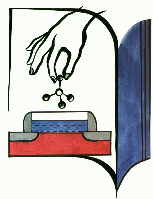 |
|||||
|
Home Nano & Giga 2002 |
|||||
|
Nano & Giga 2004 Web Site |
|||||
|
SWN2003 Workshop Phoenix, AZ |
|||||
| Moscow Visitor Tips | |||||
| FAQ | |||||
| Laptop Setup Tips | |||||
| Speakers | |||||
| Sponsors | |||||
|
Purchase Book of Abstracts |
|||||
| Abstract Submission | |||||
Proceedings
|
|||||
| Instructions for Authors | |||||
| Meeting Profile | |||||
| Conference Program | |||||
|
Nano & Giga Challenges
Summer School September 10-11, 2002
|
|||||
|
Satellite Symposium
Software Development September 15-16, 2002
|
|||||
| Exposition | |||||
| Accommodations | |||||
| Food and More | |||||
| City Transportation | |||||
| Social Program | |||||
| Visa and Travel Info | |||||
| Contact Information | |||||
| Financial Aid | |||||
| Awards | |||||
| Useful Links | |||||
| For Organizers Use |
http://www.AtomicScaleDesign.Net/Moscow
- 2016.11.11
-
The 7th Nano & Giga Challenges Symposium and School (NGC2017) will be held in Tomsk, Russia (September 18-22, 2017) hosted by Tomsk State University. Please, mark your calendar for our next meeting and visit NGC2017 web site for information and registration.
An essential enabler of the future information society -- microelectronics -- is a field at the threshold of a new phase, requiring radical innovations in materials and processes. The next generations of technology will only be possible when significant progress in physics, chemistry, material sciences, and other related disciplines, is achieved by scientists working in this field.
Microelectronics evolved successfully following the Moore's law, by reducing the scale of the components and achieving improvements in all parameters of its products, such as performance, functionality, and cost. The next stages, involving nanometric scale structures, and integration levels in the range of billion of transistors on a chip, present a number of unprecedented challenges in their practical realization, and require new materials, new technologies in photolithography and semiconductor processing, new devices, and new design strategies. Last but not least, financial challenges which stem from exploding cost of manufacturing facilities have to be contained, even though they eventually allow for unit cost reductions.
Russia, with its large intellectual potential, its outstanding education system, and its strong scientific tradition, is in the position to bring a significant contribution toward solving these challenges. This meeting is dedicated to bringing together scientists and engineers from academia, industry and national labs to discuss recent achievements and potential for collaborative efforts in solving the most challenging scientific and engineering problems in microelectronics. The leaders in the field are also invited to present tutorial lectures outline current status, and venture into emerging prospects in the most advanced and newly formed areas of microelectronics such as:
- atomic scale design: theory and experiment
- highest frequency electronics
- fabrication of nanodevices
- magnetic materials and spintronics
- materials and processes for integrated and subwave optoelectronics
- molecular electronics
- nanotubes and clusters: wires and other devices
- new materials for gate and dielectrics in FETs
- non-silicon materials and devices
- quantum effects in devices
- system design technologies